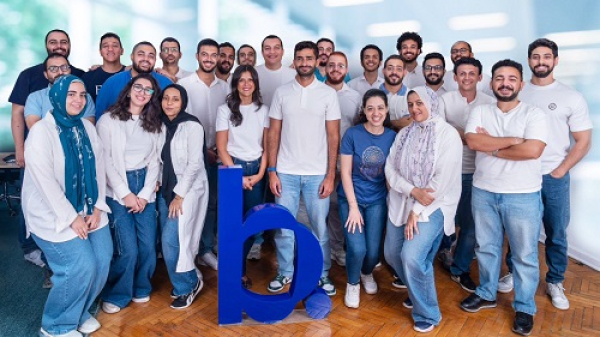Seedstars is partnering with the SANAD Fund to launch the SANAD Elevate Her program, which targets women-led startups in Africa and the Middle East. Forty startups will receive tailored support, investment-readiness coaching, and access to networks designed to promote job creation and strengthen economic resilience. Applications are open until Wednesday, November 26.
Egyptian startup Bluworks, which specializes in digitizing workforce management for field employees, has raised $1 million in seed funding to accelerate its growth in Egypt and expand across the Middle East and North Africa (MENA). The funding will support platform enhancements, the integration of advanced analytics and artificial intelligence (AI), and a stronger focus on small and medium-sized enterprises (SMEs).
- Glody Kabamba works as a SOC analyst at Rawbank after training at Orange Digital Center.
- He completed multiple online and in-person programs in cybersecurity and IT.
- His goal is to earn top certifications and take on senior cybersecurity roles.
Congolese professional Glody Kabamba is currently a Security Operations Center (SOC) analyst at Rawbank in the Democratic Republic of Congo, where he monitors, detects, and responds to security incidents to protect the institution’s information systems and data.
He holds a computer science degree earned in 2024 from the University of Kinshasa, with a specialization in information systems and cybersecurity. His studies provided a foundation in programming, databases, networks, and systems analysis, guiding him early toward cybersecurity careers.
Before joining Orange Digital Center programs, Kabamba finished university without professional experience in the digital sector. He wanted to build a solid career in cybersecurity and become a reference in the field. He said he hoped to join a major institution, such as Orange or Rawbank, to apply his skills, take on technological challenges, and contribute to securing information systems.
Kabamba learned about Orange Digital Center training through friends. He saw it as an opportunity to deepen his interest in cybersecurity while benefiting from the support of a recognized training structure.
In February 2025, he joined the ODC and completed several programs through September, including Google Cybersecurity, AWS re/Start, and IT Support. All were conducted under a partnership between ODC and the online training platform Coursera established in April 2024.
He said the cybersecurity and IT Support tracks were mainly online, which required strong autonomy. The AWS re/Start program stood out with in-person sessions supervised by a coach who regularly supported participants.
On the coach’s advice, Kabamba began posting his projects on LinkedIn to showcase his skills to recruiters. This visibility helped him enter the job market. In October 2025, Rawbank’s security department contacted him and offered him his first cybersecurity position, which he accepted as a SOC analyst.
After earning his certifications, he received additional offers, including from Huawei for a potential collaboration and from the Mining Cadastre for consulting work.
Kabamba sees his certifications not as an endpoint but as a starting point toward deeper expertise. His next goals include earning international credentials such as CISSP and CEH, along with advancing to roles with greater responsibility in shaping and managing advanced security strategies.
In the long term, he aims to become a recognized cybersecurity expert and contribute to protecting critical infrastructure in the Democratic Republic of Congo and internationally.
- First USF phase aims to extend 4G to 9,000 people in underserved regions
- New towers deployed with robust structures to support future upgrades
- 360,000 Namibians still lacked 4G coverage in 2024, along with schools and clinics
The Namibian government aims to connect more than 9,000 citizens to 4G as part of the first phase of the Universal Service Fund (USF), which seeks to expand nationwide access to telecommunications services. The target was announced this week during the commissioning of the first tower under the program in the village of Epinga, in Ohangwena region in the north, in partnership with operator MTC.
Alongside Ohangwena, this initial phase covers underserved communities in the Kavango West, Kavango East, Kunene, and Oshikoto regions, with the goal of reaching at least 80% broadband coverage in these areas. About 10,300 additional people are expected to benefit from improved 4G services.
In implementing phase 1, the company is deploying several tower types, including 60-meter lattice towers and 80-meter and 120-meter guyed masts, all designed with strong load capacities. MTC CEO Licky Erastus said this approach ensures structural stability and allows the network to adapt to future innovations.
According to the Communications Regulatory Authority of Namibia (CRAN), 360,000 Namibians — about 12% of the population — were not covered by 4G as of February 2024. The gap also affects 339 schools and 50 health facilities. For 3G, the International Telecommunication Union (ITU) estimated 89% coverage in 2023, while 2G already covered 100% of the population.
Launched in February 2025, the USF has a base investment of 145 million Namibian dollars (about 8.4 million $), funded through government grants and a 0.5% levy on telecom operators’ revenue. While network deployment brings infrastructure closer to communities, effective adoption still depends on several factors: access to compatible devices, service affordability, and digital skills.
According to DataReportal, Namibia had 2.67 million mobile subscribers at the start of 2025, representing a penetration rate of 87.1%. Internet users numbered 1.97 million, or 64.4%.
- Senegal rolls out the Startup Ecosystem program under the 2020 Startup Act.
- More than 500 startups are expected to be labeled, with 150,000 jobs targeted by 2034.
- The initiative offers training, tax incentives, financing access, and a digital one-stop shop.
The Senegalese government launched the “Startup Ecosystem” program on November 20, implementing Law No. 2020-01, known as the Startup Act, adopted in January 2020. The initiative aims to support Senegalese startups, promote innovation, ease access to financing, and strengthen public support.
The program includes a “Startup Ecosystem” label and an online one-stop shop to simplify the labeling process and access to services. More than 500 startups are expected to receive the label, with a target of creating 150,000 direct jobs by 2034. The initiative also connects investors, incubators, technical partners, and young innovative companies, supported by monitoring tools to measure impact.
The launch is part of the Technological New Deal and Senegal Vision 2050, which place innovation and digital development at the center of the country’s strategy. Labeled startups benefit from concrete support measures, including training and capacity-building programs, preferential customs regimes for importing equipment, specific tax incentives, priority access to public procurement, and tailored financing opportunities.
With this launch, Senegal now has an operational and measurable framework focused on impact. The Startup Ecosystem program is expected to stimulate local innovation, attract talent and foreign capital, and strengthen the country’s competitiveness in Africa. According to StartupBlink, an international organization that ranks global startup ecosystems, Senegal counts 48 leading startups as of November 2025, ranking 92nd worldwide and among the leaders in West Africa.
His journey proves that mastering new technical skills can transform a professional's position within an organization. He also demonstrates how strategic data utilization impacts corporate decisions and creates new leadership opportunities.
Thierno Hamidou Sow is a programmer analyst at E-CASH Guinea, a company specializing in digital development. A graduate with a bachelor's degree in software engineering obtained in 2024 from the Kofi Annan University of Guinea, he designs and maintains digital tools for his company and regularly uses datasets in his projects.
While browsing Facebook, he discovered an advertisement from the Orange Digital Center for a data analysis training program offered in partnership with the Coursera platform. This program, resulting from a collaboration announced in April 2024, caught his attention. He enrolled, began the courses on July 1, 2025, and obtained his certification on September 1.
"Before the training, I used data in my projects, but I didn't have a clear idea of how to use it optimally. The training allowed me to understand how to transform raw data into usable information, so that businesses can make fact-based decisions. I acquired the concrete skills I was looking for," he explained in an interview with We Are Tech Africa.
Upon completing the course, he said he gained a practical understanding of the processes for converting raw data into relevant information for business teams. "The certification allowed me to go beyond simple IT development. I now analyze the data generated by applications to propose fact-based solutions, better respond to market needs, and bring more value to the company," he added.
After obtaining the certification, he presented it to his management and explained the value of data analysis for the company's activities. Convinced of the usefulness of these skills, management entrusted him with his first project involving marketing data to help guide management decisions.
The results obtained were considered significant by the company, which sees this as a way to improve its analysis of the market and its performance. In recognition of this work, Thierno Hamidou Sow, then a developer, was promoted to programmer analyst, a role that combines software development and data analysis to meet operational needs.
For the future, he plans to "continue deepening my skills in data science and artificial intelligence, to better combine development and data analysis."
Melchior Koba
He concentrates on digital tools that automate complexity and enhance AI technology access. He develops an approach optimized for local and international adoption, ultimately seeking to scale the practical applications of artificial intelligence.
Okechukwu Nwaozor, a young Nigerian entrepreneur born in 2007 who is a self-taught programmer, is emerging as a new face of artificial intelligence in Africa. He is the founder and chief executive of OkeyMeta, a technology company specializing in generative AI and language models.
Founded in 2022, OkeyMeta is a platform designed for African and international use. It offers models capable of processing text, analyzing images, generating code, and automating tasks. These functions are accessible via APIs that can be integrated into any internet-connected application.
The platform's main model, OkeyAI, is a multimodal language model described as capable of analyzing multiple data types and adapting to queries in real time. It operates in the background, with users interacting through chat interfaces or APIs that send their requests to the model and return a response within milliseconds.
OkeyMeta enables the creation of virtual assistants, customer service chatbots, writing tools, document analysis systems, and image or code generation modules without users having to train their own model. The platform targets developers, startups, and businesses looking to integrate automated functions into their services, such as email response, decision support, or content personalization.
The platform also offers a fine-tuning function, which allows for the creation of a customized version of the model using an organization's data or for a specific use case. The user can define the model's name, version, tone, and domain of expertise, then provide content examples to guide its adaptation.
In April 2025, Okechukwu Nwaozor held a position as a software engineer at OIC Hub, an IT company and training center in Nigeria that also organizes workshops, events, and conferences related to programming and digital technologies.
Melchior Koba
He is redefining the current landscape by creating a clear structure for accessing African languages. This effort opens up a structured educational space that profoundly changes how these languages are studied.
Frank Akinwande Williams is a Nigerian entrepreneur working in edtech and digital culture in Lagos. He is the co-founder and chief executive of Lingawa, an online platform dedicated to learning African languages.
Founded in 2022 by Frank Akinwande Williams, Yvonne Williams, and Uche Azinge, Lingawa offers courses adapted to the pace and availability of each user through flexible schedules and the support of specialized tutors. The platform focuses on individualized progression, allowing everyone to advance at their own speed.
Learners are matched with a native tutor, selected according to their goals, level, and learning style. The tutors take the time to explain concepts, verify understanding, and encourage repetition, a method particularly useful for beginners or those wishing to reconnect with their heritage language. Lingawa currently offers Yoruba and Igbo courses.
The platform also integrates cultural content into the learning path. Films, songs, games, and interactive media are used to create a learning environment rooted in familiar contexts. The objective is to facilitate the acquisition of linguistic reflexes over the course of the sessions.
Lingawa also provides users with a mobile application that allows for revision between lessons using flashcards, games, and progress tracking tools. This complementary support helps maintain a regular pace and reinforces learning. The platform also offers virtual immersion sessions, designed to practice listening and speaking in near-real-life situations.
Frank Akinwande Williams holds a bachelor's degree in medicine, obtained in 2008 from the University of Birmingham in England. He is also a graduate of the University of York, where he obtained a bachelor's degree in economics and finance in 2012. He also holds a master's degree in financial administration, obtained in 2018 from Harvard Business School in the United States.
He began his professional career in 2012 as an investment banking services analyst at Morgan Stanley in the United Kingdom. In 2014, he joined Helios Investment Partners in London as an associate for portfolio operations and investments. In 2018, he joined Actis, a British investor, as a partner, before becoming a director in 2020, a position he held until 2022.
Melchior Koba
He explores new methods in development and cybersecurity. His work shows the transformative effect of training and proficiency on professional practices.
Ibrahim Hamadoun Macinanké is a Malian full-stack developer and IT support and maintenance technician. He holds a bachelor's degree in management IT obtained in 2023 from the University School of Technology and Management in Mali.
Between 2019 and 2020, he also completed a one-year program in science and technology, mathematics, physics, and web and mobile development at Tianjin University of Science and Technology in China.
Currently a web developer and administrator for the Chamilo e-learning platform, he seeks out every opportunity to strengthen his technical skills. He aims to deepen his mastery of modern back-end development and clarify the uses of artificial intelligence in professional environments.
With this goal, the former cybercafe manager joined the Orange Digital Center (ODC), a digital skills training and innovation support center run by telecoms operator Orange. There, he is enrolled in a training program called "Meta Back-End Developer," which he completed with a certification in July 2025. He discovered the program earlier this year through his technology monitoring. It results from a partnership signed in April 2024 between ODC and Coursera, the international online learning platform.
Through this initiative, he also obtained several supplementary certifications in June 2025, including "AI for Everyone," "Prompt Engineering Generative AI for Marketing & Advertising," and "Computer Networks and Network Security."
These courses "allowed me to better understand the best practices of professional development, database management, and the fundamental principles of AI," he told the editorial team of We Are Tech Africa.
Macinanké said he was able to "immediately apply my new knowledge in my personal projects. I improved the structure of my applications, strengthened back-end code security, and refined my working method." He also revealed he is currently working on "a technological component and a 'made in Mali' application that will be among the most beneficial solutions for my fellow citizens."
He believes the entirety of this training has had a direct effect on his technical level and his skills, including those he had already consolidated previously, and that it will guide his future projects.
Despite the certifications obtained, Ibrahim Hamadoun Macinanké plans to continue his online training, contribute to collaborative projects, and get involved in developer and cybersecurity communities.
"My goal is to become a back-end focused full-stack developer specialized in cybersecurity, capable of creating high-performance and secure applications for the service of education and technological innovation," he said.
Melchior Koba
Tunisia launched on November 19 a National Charter aimed at strengthening families’ capacity to ensure a safe digital environment for children. The initiative, led by the Ministry of Family, Women, Children and Seniors and the Ministry of Communication Technologies, is supported by telecom operators, Internet service providers, public media, and other sector actors.
In her remarks, Family Minister Asma Jabri stressed that the family is “the first line of defense for the child.” Families must therefore receive the tools needed to interact safely and effectively with digital technologies through awareness, training, and guidance. This support will enable parents to follow technological developments and provide positive, responsible supervision of their children’s online activities.
The initiative comes as children are increasingly connected to the Internet for both entertainment and learning. The International Telecommunication Union (ITU) estimates that a child somewhere in the world goes online for the first time every half-second. In Tunisia, Communication Technologies Minister Sofiene Hemissi recently reported that minors aged 12 to 16 spend an average of eight hours per day online.
In October, during a conference organized by the Ministry of Interior alongside the Ministries of Defense and Communication Technologies, Mr. Hemissi highlighted the rise in cyberthreats targeting minors, intensified by the use of artificial intelligence. He noted that risks no longer concern only exposure to immoral content but now include the spread of false historical, religious, and cultural information.
In this context, the government had already launched in 2024 a National Action Plan for preventing and responding to online violence against children, in partnership with UNICEF. “While access to this technology provides numerous educational and social benefits to children, it also has the potential to expose them to risk and cause harm. Furthermore, it is possible for both risks and harms to traverse the digital and physical environments, whereby online risks can become offline harms and vice versa.,” the UN agency stated at the time.
Meanwhile, the GSMA, in partnership with UNICEF, launched in late October 2025 a working group dedicated to online child protection. This multi-stakeholder platform aims to guide, coordinate, and strengthen efforts across Africa while building national and regional capacities to ensure children’s safety online. The group includes major telecom operators on the continent, including Orange, which operates in Tunisia.
More...
-
Ayokai launched Kokamba in 2024 as an ERP solution built by Congolese engineers and aligned with African accounting standards, including SYSCOHADA and OHADA.
-
Kokamba operates offline, enabling SMEs in low-connectivity zones to manage finance, HR, billing, and operations from a unified dashboard.
-
The platform centralizes financial data and strengthens regulatory compliance, which could boost the efficiency and growth of Congolese SMEs.
Ayokai drives a local digital-transformation push with Kokamba, an ERP solution designed by Congolese engineers for African businesses. The Franco-Congolese startup launched the system in 2024 under the leadership of Mardochée Bikoukou.
Kokamba targets companies, associations, NGOs and public institutions. It functions as an integrated management platform and respects several African norms, including SYSCOHADA. Ayokai positions Kokamba as a fintech tool that supports organizations that need coherent financial and operational structures.
The platform allows managers to control operations from a single dashboard. Kokamba groups accounting, billing, HR management, financial reporting, service management and payroll. It also integrates modules that track employees, support HR planning and generate financial statements that follow regional requirements.
The system maintains usability in low-connectivity environments. Kokamba runs offline and syncs online when networks become available. This capability suits Congolese SMEs and field-based structures that operate in areas with limited internet access.
Kokamba also stands out through its compliance with OHADA standards. The platform secures accounting and fiscal conformity for local firms. By centralizing financial data, Kokamba gives managers a clearer view of cash positions and key indicators, which helps them make informed decisions without depending solely on external accountants.
The platform may strengthen the operational efficiency of small and medium-sized enterprises. Kokamba supports business structuring and could stimulate SME growth in an increasingly demanding economic environment.
This article was initially published in French by Adoni Conrad Quenum
Adapted in English by Ange Jason Quenum
-
Somalia made the Electronic Cargo Tracking Note (ECTN) mandatory for all imports and exports as of late September.
-
The system ends the exclusive revenue control long held by Somaliland, Puntland and Jubbaland over their ports.
-
Non-compliant importers face penalties including fines, asset seizure, licence suspension or criminal prosecution.
Somalia has adopted the mandatory use of the Electronic Cargo Tracking Note (ECTN) as the government seeks to curb fraud and tighten control over port revenues. More than twenty African countries already use similar systems to strengthen trade governance.
The government has enforced the requirement following a directive from the Ministry of Ports and Maritime Transport. The measure, which took effect in late September, applies to all imports and exports passing through Somali ports. Authorities introduced the ECTN in February 2023, but the system had seen uneven implementation across port facilities.
The ministry now requires importers to obtain an ECTN through the official platform, ctnsomalia.com, before any loading or unloading operation. Importers must include the ECTN number on the bill of lading. Customs officers will reject any shipment without a valid certificate.
The authorities warn that violators face fines, asset seizure, licence suspension or criminal prosecution under Somali law. Officials argue that the rules will enhance transparency, reinforce maritime security and reduce commercial fraud.
The system also recentralises port revenue management. It ends a long-standing arrangement under which Somaliland, Puntland and Jubbaland collected port revenues without direct oversight from the federal government.
Although Somalia introduced the ECTN in 2023, enforcement remained partial until now. The nationwide mandate aligns the country with a broader continental trend, as more than 24 African states already require electronic cargo certificates to reduce fiscal losses and strengthen customs control.
By making the ECTN compulsory, the government aims to unify port governance, close traceability gaps and regain control over fragmented commercial circuits. The measure carries strategic weight because Somali ports handle nearly 95% of the goods consumed in the country and represent one of the state’s main non-tax revenue sources.
This article was initially published in French by Samira Njoya
Adapted in English by Ange Jason Quenum
-
LimaBot allows Tanzanian farmers to diagnose crop diseases in real time through mobile apps, WhatsApp, SMS and USSD.
-
The platform recommends treatments and provides weather forecasts and preventive management strategies.
-
The solution aims to cut yield losses, reduce excessive pesticide use and strengthen farmers’ resilience.
LimaBot AI is emerging as a key player in Tanzania’s agricultural innovation by bringing artificial intelligence directly to smallholder farms. The Tanzanian start-up built a digital platform that farmers can access via mobile application, WhatsApp, SMS or USSD to diagnose crop diseases in real time. The company, based in Arusha, launched in 2024 under founder Godfrey Kilimwomeshi.
The platform does more than provide general advice. It analyses data, photos and symptom descriptions submitted by farmers, recommends biological or chemical treatments, and supplies weather forecasts and preventive management strategies. Because it functions in low-connectivity areas, farmers can interact with LimaBot through simple channels such as SMS and USSD.
Crop-disease losses continue to undermine family farming across Africa, particularly in Tanzania. By enabling early detection and offering tailored recommendations, LimaBot helps limit yield pressure, reduce excessive pesticide use and support more sustainable practices.
The solution creates dual benefits for farmers. It secures harvests while helping producers build autonomy through progressive training in plant-health best practices. This capacity building can improve resilience to climate shocks and volatile input prices.
By democratising access to quality diagnostics, the start-up strengthens the emergence of a sustainable agri-tech ecosystem. LimaBot positions AI as a tool that boosts productivity, supports food security and improves the economic well-being of farmers.
This article was initially published in French by Adoni Conrad Quenum
Adapted in English by Ange Jason Quenum
African startups under five years old can now apply to the Harvard New Venture Competition, which will award up to $55,000 in prizes at the Africa Business Conference in Boston on March 27-28, 2026. The top 30 applicants will also receive mentorship from MBA student consultants. Applications are open now.















